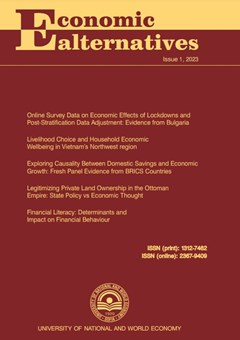Exploring Causality Between Domestic Savings and Economic Growth: Fresh Panel Evidence from BRICS Countries
Author: Debasis Chakraborty
Abstract
The paper analyses the direction of causality between domestic savings and economic growth for BRICS countries with the help of secondary data. It also examines the functional interrelationship between savings and economic growth to answer one of the key questions if the rapid economic growth of these emerging countries can be explained by their extent of savings. The Dynamic panel estimation method has been applied to examine both the short-run and the long-run relationship between savings and economic growth. Both Granger and Dumitrescu-Hurlin panel granger causality tests have been used to explore the direction of causality. Results of panel autoregressive distributed lag (ARDL) model show that both in the short-run and in the long-run, gross domestic savings significantly explains economic growth. Both the causality tests argue in favour of bi-directional causality between savings and economic growth for BRICS countries. Country-specific results show mixed causality where India, China and South Africa experienced bi-directional causality. For Brazil the causality is only from savings to economic growth while there is no causality for Russia. The study will help the policymakers to formulate monetary and fiscal policies that will be either saving-friendly or income-friendly.

